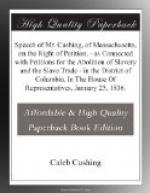I produce this speech, not for the purpose of adopting all its views, for some of them I confess are new to me, and such as I have not had time or means to investigate, but in order to show conclusively what Mr. Madison deemed wise and proper to be done in a contingency so precisely like the present. Accordingly, all the petitions were committed to a select committee; that committee made a report; the report was referred to a committee of the whole House, and discussed on four successive days; it was then reported to the House with amendments, and by the House ordered to be inscribed in its journals, and then laid on the table.
That report, as amended in committee, is in the following words: “The committee to whom were referred sundry memorials from the people called Quakers; and also a memorial from the Pennsylvania society for promoting the Abolition of slavery, submit the following report, (as amended in committee of the whole.)
“First, That the migration or importation of such persons as any of the States now existing shall think proper to admit, cannot be prohibited by Congress prior to the year 1808.”
“Secondly, That Congress have no power to interfere in the emancipation of slaves, or in the treatment of them, within any of the States: it remaining with the several States alone to provide any regulation therein which humanity and true policy may require.”
“Thirdly, That Congress have authority to restrain the citizens of the United States from carrying on the African slave trade, for the purpose of supplying foreigners with slaves, and of providing, by proper regulations for the humane treatment, during their passage, of slaves imported by the said citizens into the States admitting such importations.”
“Fourthly, That Congress have also authority to prohibit foreigners from fitting out vessels in any part of the United States for transporting persons from Africa to any foreign port.”
Now, I entreat the House to call to mind the effect of these proceedings. There was no insurrection, no servile war, no agitation in the South. Congress calmly and considerately examined the whole broad question, not of the slave trade only, but also of the slave interest. It decided how far it could go, and how far it would go. Its decision went forth to the world, and settled the questions involved in it, as it were, forever. Nearly fifty years have since elapsed, and I am not aware that the points then adjudged have at any time since been drawn into debate or controversy. And I do declare my solemn conviction, that if the House would now pursue the same course, and dispassionately determine what it can or cannot do, and make that determination known to the country in a respectful way, the result would be precisely the same in this vexed question of the District of Columbia.




